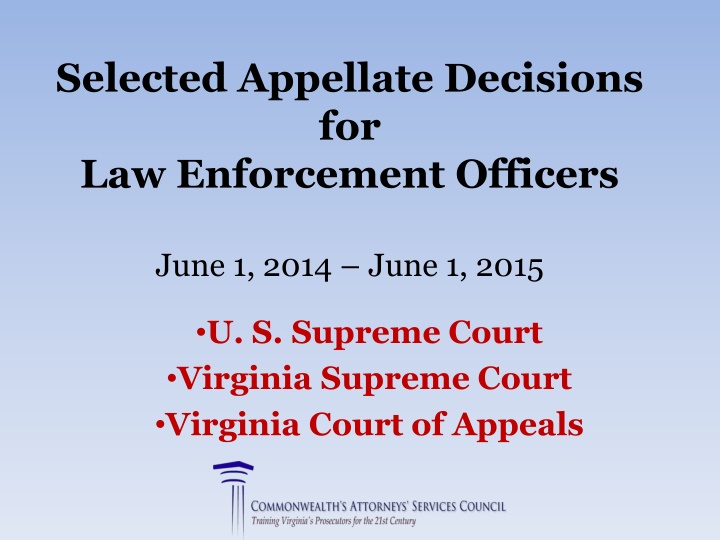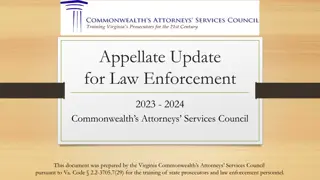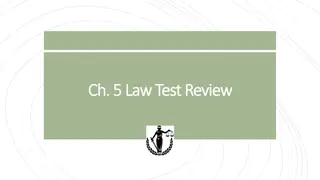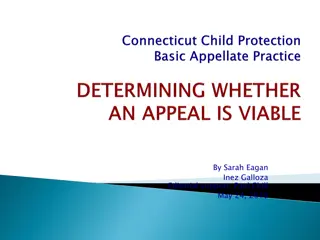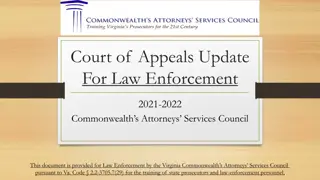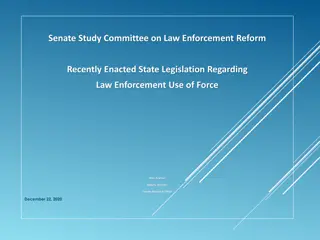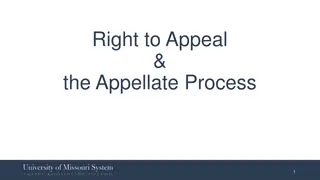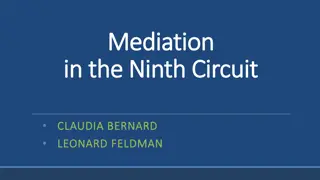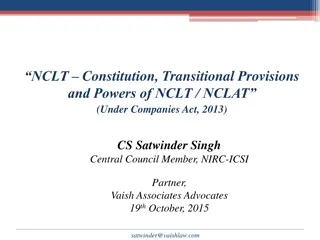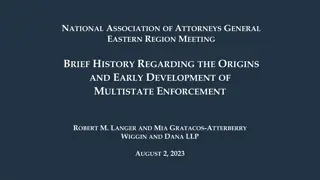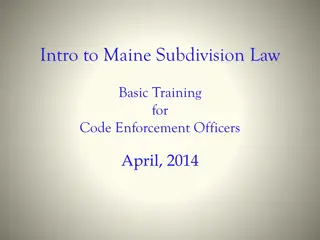Appellate Decisions for Law Enforcement Officers - Selected Cases Summary
This collection highlights key appellate decisions relevant to law enforcement officers, focusing on cases from the U.S. Supreme Court, Virginia Supreme Court, and Virginia Court of Appeals. The cases discussed include rulings on search warrants related to cell phones, magnetic media, marijuana odors, and more, providing valuable insights and guidance for law enforcement professionals. The decisions emphasize the importance of obtaining search warrants, while also outlining exceptions such as exigent circumstances.
Download Presentation

Please find below an Image/Link to download the presentation.
The content on the website is provided AS IS for your information and personal use only. It may not be sold, licensed, or shared on other websites without obtaining consent from the author.If you encounter any issues during the download, it is possible that the publisher has removed the file from their server.
You are allowed to download the files provided on this website for personal or commercial use, subject to the condition that they are used lawfully. All files are the property of their respective owners.
The content on the website is provided AS IS for your information and personal use only. It may not be sold, licensed, or shared on other websites without obtaining consent from the author.
E N D
Presentation Transcript
Selected Appellate Decisions for Law Enforcement Officers June 1, 2014 June 1, 2015 U. S. Supreme Court Virginia Supreme Court Virginia Court of Appeals
Please refer to 2015 Appellate Update Master List for a complete listing of new cases of interest to law enforcement officers.
4thAm. Search Warrants Riley v California and U.S. v Wurie 573 U.S. ___ (2014) U.S. Supreme Court Cases Riley v California 573 U.S. ___ (2014) Riley was arrested for possession of loaded firearms. Subsequent to arrest, officers found and searched his smartphone without obtaining a warrant for its contents. The phone contained various materials connecting Riley to an earlier shooting and gang activity. Riley was convicted of involvement in that shooting. United States v Wurie 134 S. Ct. 999 (2014) Wurie was arrested for selling narcotics. Incident to arrest, officers seized his older-style flip phone. The phone was receiving calls from a location called my house. Officers opened the phone and used the information inside to locate Wurie s house. Officers obtained a search warrant on the house and discovered drugs and firearms.
4thAm. Search Warrants Riley v California and U.S. v Wurie Holding: Convictions Reversed Police must obtain a search warrant before searching a cell phone seized incident to an arrest. Exceptions: Exigent circumstances may exist. The body of the phone may be physically examined, e.g. to determine if there is a razor blade hidden in the case. Officers may use Faraday bags or aluminum foil to prevent phone from receiving a signal and being wiped remotely.
4th Am. Search Warrant Harris v Commonwealth Unpublished Defendant, a registered sex offender, sexually assaulted a child in his home and videotaped the offense. State police officer obtained a search warrant for defendant s home that sought items including computer systems and digital storage media. Officer located a video camera and videotape that recorded the assault. Defendant claimed videotape was outside scope of the search warrant. Held: Affirmed. Court ruled that videotape is a form of magnetic media and fell under scope of the search warrant.
4th Am. Search Warrant Commonwealth v Dawson Unpublished Officers could smell marijuana outside Defendant s residence. They knocked on his door and detained him and his friends. Officers conducted a protective sweep of the interior of the residence, exited, and obtained a search warrant. The search warrant noted the odor coming from the residence, but additionally noted that officers observed baggies of marijuana inside the residence while conducting the protective sweep. The trial court suppressed the evidence; CA appealed.
4th Am. Search Warrant Commonwealth v Dawson (con t.) Unpublished Holding: Evidence Admissible A search warrant is not invalid simply because it contains tainted evidence. The odor of marijuana, alone, was sufficient to justify the search. Distinguish from Murray, where the entire search was unlawful due to the initial, unlawful entry. Here, the purpose of the illegal protective sweep was for officer safety and not to look for evidence.
4th Am. Search Warrant Flashback: Florida v Jardines 133 S. Ct. 1409 (2013) Officers brought drug-sniffing dog onto Defendant s porch. The dog alerted, and a search warrant was issued for the house. Holding: Illegal Search. The use of a drug-sniffing dog on a front porch constituted a warrantless search. Curtilage = the area surrounding and associated with the home. Curtilage is part of the home for 4th Amendment purposes. Officers have an implied invitation to approach the house to speak to the owner, but not to conduct a search.
4th Am. Traffic Stop Sanders v Commonwealth ___Va. App.___ (2015) Officers used a drug-sniffing dog in a motel hallway. The dog alerted outside Defendant s room and a search warrant was obtained. Holding: Evidence Admissible While a motel room has protections similar to a home, the hallway outside the motel room is not curtilage under Florida v Jardines. A warrant is not required to use a drug-sniffing dog in a motel hallway.
4th Am. Traffic Stop Heien v North Carolina 135 S. Ct. 530(2014) North Carolina law requires that only one functioning taillight must be operational; however, the law was not clearly written and the courts had not clearly interpreted it this way. Officer mistakenly believed the law required that both brake lights be operational. Officer stopped Defendant for having only one operational brake light and discovered a large quantity of drugs.
4th Am. Traffic Stop Heien v North Carolina (con t.) 135 S. Ct. 530 (2014) Holding: Evidence Admissible Reasonable suspicion can rest on a mistaken understanding of the scope of a legal prohibition. That mistake must be objectively reasonable. What is a reasonable mistake? A mistake a reasonably well-trained officer would make. NOT a mistake based on an officer s subjective understanding of the law or based on a sloppy study of the laws he is duty-bound to enforce.
4th Am Traffic Stop Mason v Commonwealth ___Va. App.___ (2015) Reversing earlier panel decision. Defendant was driving with a parking pass measuring 3 x 5 hanging behind his mirror. Officer stopped Defendant and discovered narcotics. Holding: Evidence Admissible. The pass could obstruct a driver s view, creating reasonable suspicion. Not relevant whether the officer himself actually believed the facts were suspicious. Question is whether reasonable suspicion exists under the objective facts.
4th Am Traffic Stop Pork v Commonwealth Unpublished Officer approached Defendant in his vehicle and informed him he was investigating a call for a suspicious vehicle. Officer noticed a firearm in the back seat, within Defendant s reach. Officer asked Defendant if there were any weapons in the car. Defendant did not answer but his eyes shifted right. Officer ordered him out of the car. He concealed his right hand between the seat and center console. Officer ordered him to reveal his hand, but he refused to comply. Officer ordered Defendant out of the car at gunpoint. Heroin was discovered in Defendant s pocket
4th Am Traffic Stop Pork v Commonwealth (con t.) Unpublished Holding: Evidence Admissible (possession of heroin) Defendant was not seized until he complied with officer s command to step out of the vehicle. At the point of seizure, Officer had developed reasonable suspicion that the Defendant was carrying a concealed weapon, and therefore was armed and engaged in criminal activity.
4th Am. Traffic Stop Billups v Commonwealth Unpublished Police, through binoculars, observed two men engage in hand-to-hand transaction. Defendant appeared to take possession of an item. Defendant left in a vehicle driven by a third person. Officers stopped the vehicle, obtained consent to search, and located cocaine in the car. Holding: Conviction Upheld Hand-to-hand transaction in a high-drug area provided reasonable suspicion. Officer s training and experience provided that basis.
4th Am. Traffic Stop Creekmore v Commonwealth Unpublished* Defendant stopped his car behind a police car. Officer shined his spotlight on Defendant, then turned it off and approached. Officer asked for ID, Defendant had none. Officer ran Defendant to cite him for driving without a license in possession. Discovered Defendant s license was revoked. *2/11/14 Technically last year s case but worth repeating.
4th Am. Traffic Stop Creekmore v Commonwealth (con t.) Unpublished Holding: Conviction Upheld The initial encounter was consensual. Using the spotlight was not a seizure. Officer did not block the Defendant s egress. When the officer asked for identification, he was not exercising any authority to do so, but merely asking if Defendant would voluntarily produce his license.
4th Am. Traffic Stop Commonwealth v Rosser Unpublished Officer received a BOLO for a gold Nissan Maxima driven by a bald male connected with drug activity BOLO was based on an anonymous tip. Officer saw the car and followed it briefly. Defendant turned abruptly. Officer considered this evasive behavior. Officer did not observe any traffic violations, but stopped the vehicle. Marijuana was located in the vehicle, and Defendant had a suspended license.
4th Am. Traffic Stop Commonwealth v Rosser (con t.) Unpublished Holding: Evidence Inadmissible Motion to suppress was properly granted, as in Harris (258 Va. 576) Lawful behavior can provide reasonable suspicion when it is evasive, but an abrupt turn was not sufficiently evasive. Distinguish from recent U.S. Supreme Court case Navarette v California. There the tip specifically described criminal behavior through a recorded 911 call that could be verified, traced, or justifiably relied on, and the tip was made minutes before the arrest. The BOLO here rested on an anonymous, vague tip.
4th Am. Traffic Stop Wilson v Commonwealth Unpublished Officer stopped car for not using a turn signal. Officer testified that the lack of a turn signal might have affected his own vehicle s movements. There were other cars in the general area. Drugs and a gun were found on the passenger. Held: Affirmed. Failure to use a turn signal is sufficient reasonable suspicion provided that other vehicles are in the vicinity and may be affected by the un-signaled turn.
4th Am. Stop Commonwealth v Mosley Unpublished * Officers observed Defendant walking alone on public housing property in violation of no-trespassing rules. Officers knew Defendant to be a habitual trespasser. Defendant fit description of suspect in an incident at the property the night before. Defendant appeared nervous and repeatedly put his hands in his pockets, against instructions. Officers initiated a pat-down. Defendant resisted. Officers noticed a handgun in Defendant s jacket during the struggle.
4th Am. Stop Commonwealth v Mosley Unpublished * Holding: Evidence Admissible Officers had reasonable suspicion to conduct pat-down. Totality of the Circumstances Nervous and suspicious behavior Suspect in prior case Trespassing Distinguish from Roulhac - placing hands in pockets is NOT enough, by itself, to justify a pat-down *2/11/14: Technically last year s case but worth repeating.
4th Am. Stop Commonwealth v Vick Unpublished Officers found Defendant asleep on the metro. He was escorted off the train. They asked for his name and he provided ID. While holding his ID, officers asked his permission to search his backpack and he agreed. The backpack contained marijuana and PCP. Holding: Evidence Not Admissible A reasonable person would not have felt free to leave given that he was ordered and escorted off a train and the officers were holding his ID.
4th Am. Stop Parker v Commonwealth Unpublished Defendant was riding a bicycle on public housing property. Officers asked to speak to him and he agreed. He provided his ID and officers issued a barment notice, banning him from the property. After returning the ID, the officer asked to look at the bike s serial number. Defendant agreed, and the bike was determined to be stolen. Defendant was arrested and drugs were found on his person.
4th Am. Stop Parker v Commonwealth (con t.) Unpublished Holding: Evidence Admissible Once officers returned the ID and issued the barment notice, Defendant was free to leave. The conversation about the bicycle was a consensual encounter. Nothing in the officers words or actions suggested the Defendant was not free to leave. Officers were not required to inform the Defendant that he was free to leave.
4th Am. Stop Minter v Commonwealth Unpublished Officers drove slowly past Defendant, who began to walk faster and crossed a muddy pool to get away. Officers stopped their vehicle and he agreed to speak Defendant appeared was stammering, appeared nervous and was reaching into his pockets against instructions. Officers conducted a pat-down and asked if he had any weapons. He stated he did, and officers located a handgun.
4th Am. Stop Minter v Commonwealth (con t.) Unpublished Holding: Evidence Not Admissible. Officers seized the Defendant as soon as they conducted the pat-down. Defendant walked away from officers, but they were driving an unmarked vehicle. Defendant was nervous, but provided his correct name and answered their questions. Putting hands in pockets was not enough to provide reasonable suspicion.
4th Am. Stop Gilliam v Commonwealth Unpublished Defendant attempted to break into a residence. Police responded to a call and found Defendant, who matched the caller s description. Defendant started to look around and quickly walked away, looking for a place to run. Defendant was stopped and cuffed and later ID d as the perpetrator. Holding: Evidence Admissible Suspect s unauthorized presence on the premises of a suspected burglary provides reasonable suspicion. Attempted flight additionally provides such suspicion.
Sufficiency Driving Suspended Barden v Commonwealth __ Va. App.__ (2015) Defendant s license reflected DUI convictions in 2008, followed by 12 month license suspensions. His license was then suspended for failure to pay fines and costs. Defendant then paid those fines and costs, but had failed to pay the reinstatement fee and obtain a new license. Holding: Conviction Overturned Defendant s license was no longer suspended after he paid the fines and costs. Must be tried under 46.2-300, No Operator s License.
Sufficiency DUI Sarafin v Commonwealth ___Va. __ (2014) Defendant drove while intoxicated and fell asleep in his private driveway with the key in the auxiliary position. Officer woke Defendant and arrested him for DUI. Holding: Conviction Upheld Defendant was the operator of the vehicle. No requirement that vehicle be operated on a highway to sustain a DUI conviction that requirement is unique to mopeds and instances where the Commonwealth relies on implied consent. No requirement that Defendant intended to operate vehicle.
Sufficiency Reckless Driving Blevins v Commonwealth 63 Va. App. 628 (2014) Defendant was on the interstate, driving between 75 and 80 mph on a rainy night. While attempting to pass on the right, Defendant struck another vehicle, killing the passenger. Holding: Conviction Upheld Evidence of the high-speed, aggressive driving, in the rain, at night, was sufficient to prove reckless driving
Sufficiency Eluding Jones v Commonwealth __Va. App.__ (2015) Officers used lights and sirens to stop Defendant for DUI. They ordered him to remove keys, but instead he drove away while officers were partially inside vehicle, causing them to fall to the ground. Defendant drove away in a reckless manner. Held: Affirmed. Court rejected the argument that he was not guilty of eluding because his behavior took place after stop.
Sufficiency PWID Wallace v Commonwealth __Va. App.__ (2015) Responding to a tip, police found Defendant in a car with 29 small bags of marijuana in the center console. Total weight was 19.5 grams. Detective testified that 29 small bags was inconsistent with personal use. Held: Affirmed. Court rejected argument that lack of scales, cash or guns left the evidence insufficient. Packaging was sufficient to demonstrate PWID.
Sufficiency Possession of Cocaine Brown v Commonwealth Unpublished Officer smelled marijuana coming from car. Another office noticed marijuana on floorboard. Defendant, who had been driving, consented to a search. Officers located cocaine in cup holder. Defendant denied ownership of car and said that he had looked in cupholder and there was no cocaine. Held: Affirmed. Statement that he looked in cupholder demonstrated dominion and control.
Sufficiency Concealed Handgun Hodges v Commonwealth ___Va. App. ___ (2015) Defendant parked along a highway and went to sleep with engine running. Handgun was in center console. Officer could not recall whether the console was latched or fastened closed. Holding: Conviction Overturned The Commonwealth bears the burden of proving that the handgun was not secured in a container. (It is not an affirmative defense). Since the officer could not remember, the evidence was insufficient.
Sufficiency Protective Orders Stephens v Rose __ Va. __(2014) Civil case. Respondent and victim ended their relationship years before, but respondent began to contact victim obsessively. Victim informed respondent that any contact was unwelcome and threatened to call the police. Respondent continued to call her in the middle of the night and showed up at her house at 7 am with flowers. Victim obtained a protective order. Respondent challenged that order.
Sufficiency Protective Orders Stephens v Rose __ Va. __(2014) Holding: Protective Order Upheld Va. Code 19.2-152.10 allows a court to issue a protective order when the victim is or has been subjected to an act of violence, force, or threat. Stalking can be such an act. Evidence that respondent received notice that his contacts were unwelcome supports the finding that respondent should have known his contacts would cause fear. Victim s fear was reasonable here. She need not specify exactly what harm she fears.
Sufficiency Protective Order Wyant v Commonwealth Unpublished Defendant was subject to a protective order. He drove to victim s house, stood on her property line and took pictures of her and her home. Victim was looking at the Defendant from approximately 50 feet way. Holding: Conviction Upheld Defendant had contact with the victim. His contention that he did not know if the victim was present was rejected under the facts.
Sufficiency Protective Order Walton v Commonwealth Unpublished Defendant was subject to a protective order. Defendant approached victim aggressively with his dog while carrying something in his hand. Victim sat in his truck, nervous and scared, while Defendant filmed him and the dog circled the truck, growling and barking. Holding: Conviction Upheld Victim was in fear during the violation and Defendant s actions were threatening. Defendant was responsible for his dog s actions.
Sufficiency Strangulation Dawson v Commonwealth 63 Va. App. 429 (2014)* Defendant struck the mother of his child and pinned her with his arm, choking her unconscious. She suffered a fractured rib, a ligature wound around her neck and general pain and bruising. Holding: Conviction Upheld Bodily injury means the same thing in strangulation cases as in felony assault cases. Bodily injury = any bodily hurt whatsoever * 5/24/14 - Technically, last year s case but worth repeating.
Sufficiency Strangulation Moore v Commonwealth Unpublished* Defendant struck and strangled his girlfriend. She suffered a scratch on her neck, minor swelling of her forehead, and had blood on her shoulder. She later suffered swelling on her neck. 18.2-51.6 requires proof of bodily injury to prove strangulation. Holding: Conviction Upheld Bodily injury means any bodily hurt whatsoever. No requirement that victim receive medical attention or suffer residual effects. * 5.6.14 Technically, last year s case but worth repeating
Sufficiency Abduction Norman v Commonwealth Unpublished Defendant smashed his way into victims house, tearing the doors off the hinges and assaulting the victim. In view of the victim s sister, defendant marched victim out of the house. Sister testified to these events; the victim recanted. Held: Affirmed. Court ruled that trial court was entitled to believe the sister and reject the testimony of the victim.
Sufficiency Abduction Norman v Commonwealth (con t.) Unpublished The court wrote: Trial courts are confronted on a daily basis with victims of DV who are reluctant to bring to justice those who frighten and abuse them, whether from motives of affection, financial independence, ongoing fear or some other reason. Trial judges need not blind themselves to these realities when they make factual determinations.
Sufficiency Malicious Wounding Howard v Commonwealth Unpublished Defendant beat the mother of his children repeatedly, putting her in the hospital for two days. The attack left her bleeding from the head and scarred. Convicted of Malicious Wounding Holding: Conviction Upheld Evidence must show an intent to permanently injure the victim, i.e., to maim, disable, disfigure, or kill. Evidence met this burden.
Sufficiency Malicious Wounding Conway v Commonwealth Unpublished Defendant punched victim at least 3 times with his fist. Victim suffered swelling and hemorrhages to both eyes, plus bruises to face. E.R. doctor testified very severe force was used. Holding: Conviction affirmed. Court rejected argument that a weapon must be used to cause wound fists are sufficient.
Sufficiency Attempted Capital Murder Howard v Commonwealth (con t.) Unpublished Officers told him to stop, but Defendant tightened grip, even after being shot in the back. Held: Affirmed. Court found that, despite his intoxication, Defendant had the specific intent to kill the officer. Court rejected argument that Defendant only wanted to escape.
Sufficiency Contributing to Delinquency Miller v Commonwealth Unpublished Defendant left her 2 year old in her unlocked car, double- parked, with the engine running and windows open as she visited a grocery store. Defendant asked an employee inside to watch her car for five minutes, but did not tell the employee her child was inside. The employee watched the car for over 30 minutes before he had to leave. Defendant returned, took her keys from the car and returned inside for another 30 minutes. Defendant convicted of Contributing to the Delinquency of a Minor.
Sufficiency Burglary Grimes v Commonwealth __Va.__ (2014) Defendant was convicted of burglary for breaking into crawl space under a house. It had no direct access to house. Defendant stole copper pipes. Held: Affirmed Court ruled crawl space was structurally part of the house, observing that the space was within the 4 walls and under the same roof. Crawl space contained integral utilities and was functionally interconnected and contiguous to the house.
Sufficiency Grand Larceny Winslow v Commonwealth __Va. App.__ (2015) Defendant was convicted of stealing money and 2 laptops from a parked car. His fingerprints were found on a box that had contained victim s money. The lap tops had been near the box. Victim did not know defendant and had never let him in the car. Held: Affirmed. Court found that fingerprints are an unforgeable signature. Court rejected argument that CA must exclude any other possible source of the fingerprints. It was reasonable to assume person who took money also took the laptops.
Sufficiency Contributing to Delinquency Miller v Commonwealth (con t.) Unpublished Holding: Conviction Upheld Defendant s conduct rendered the child abused or neglected because the child suffered an unreasonable absence of her parent. Leaving a stranger in charge of her child was not reasonable or sufficient. No requirement to prove child suffered actual harm. Defendant acted willfully in a criminally negligent manner.
